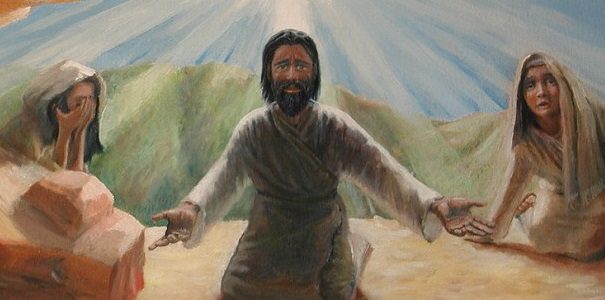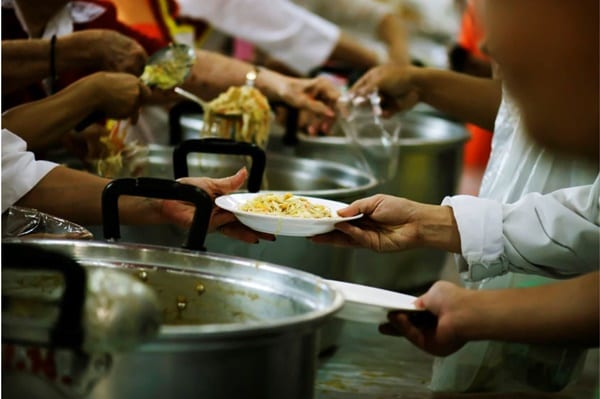
(Below is a slightly modified adaptation of a sermon I preached for All Saints Sunday, 2012, based on the Gospel of John, chapter 11, verses 32-44, or “The Raising of Lazarus.”):
Friends, there are at least two themes to this familiar Gospel story: resurrection and friendship. How appropriate for All Saints Sunday, when we celebrate our eternal friendship, united in the joy of resurrection in God’s holy reign! I want to suggest that friendship and resurrection are deeply connected. It is not merely that we will all be friends in heaven. In a very real sense, friendship is resurrection.
Saint Paul says that to be in Christ is to be a new creation. And to be in Christ is to be in friendship, in free and voluntary love, with him. And if we are in friendship with Christ we are also united in the body of Christ as friends.
I once found it strange that Jesus wept moments before raising Lazarus from the dead. After all, he knew that joy was about to conquer sorrow. Why, then, did he weep?
Yet the more I meditate on Jesus, the more I see that he could not have done otherwise. He wept because he was human. He wept because he was God. And he wept because Lazarus was his friend.
To be human is to feel the urgency of human need, even when you have faith that, in the end, all will be well. It is to weep with others, to shoulder their pain so that the weight of sorrow does not crush them.
As God in flesh, Jesus understood the suffering of Lazarus and his sisters more deeply than they themselves ever could. He mourned the pain that Lazarus endured in his final hours. He felt the anxiety of Mary and Martha, missing their brother and facing the double oppression of occupation and sexism. Impoverished women, living without a man under an occupying power, could hardly make a life for themselves and were often left behind by their society.
And Jesus mourned the violence that permeates human nature and creates such unjust systems, which burden people of all times and places.
But beyond all of that, Jesus had lost a personal friend. He had lost someone with whom he had shared laughter and stories and tears. Grief was the only possible response.
We tend to think Jesus wept before he raised Lazarus from the dead. But what if tears were part of the resurrection process itself?
It wasn’t just Jesus’ power that raised Lazarus. It was Jesus’ love. Love is the power, love is the whole being, of Jesus, indeed the whole being of God revealed in Jesus. And love is vulnerability. It is sharing another’s pain. It is weeping.
If Lazarus could not have been healed without Jesus’ love, does that mean that he could not have been healed without his tears? I think so. And I believe the tears are the birth-pangs of the same suffering love that would be fully borne on the cross.
We know that God is Love, and Love is the power that gives us eternal life. But love can seem abstract and fuzzy. We can say we love humanity and truly wish to help all people. But an awareness of the suffering of the world rarely makes us weep, unless we see that suffering manifested in a friend.
God’s love manifested itself for us in the most personal and profound way – in the life of our best friend Jesus, who weeps with us in our darkest hours even as he leads us into the splendor of eternal light and life. We are bound to him at our most vulnerable by mutual tears. What a friend we have in Jesus.
And if our new life in Jesus is this profoundly intimate friendship, then we are bound to each other in friendship as well. I began this article with the word “Friends” because you, dear readers, are my friends. Friends forever. It’s not just a catchy phrase to write in a yearbook; it is our eternal destiny in Christ.
We are united in a love that transcends all bounds, a love not compelled by family bonds or common associations, but freely given and received in grace. This is what it means to be the communion of Saints.
What if, today, we all commit to deepening our relationships with those around us, and journey further into the new life we have received in Christ? This doesn’t mean looking past differences, but exploring them more deeply, with open minds and hearts. It means setting aside judgment and listening with empathy. It means taking a risk, making ourselves vulnerable, as Jesus was when he wept.
We are called by Christ to love all people, regardless of race, language, politics, sexual orientation, or creed. But because we are human, we must wait until we are united in the fullness of God’s kingdom before we can know them all. We cannot offer personal friendship to every single person on earth. But we all know those to whom we can offer it. It is in particular friendships and concrete acts of kindness that we transcend our prejudices and deepen our love for humanity.
We can take the time today to make a new friend, or deepen a relationship with someone we know only by sight or name. The more we open ourselves to others in friendship, the more we will see Christ revealed, and the deeper we will feel ourselves fall into the secure embrace of God’s love.
In the name of God who models the perfect friendship in Triune Harmony and unites us in eternal friendship as the Communion of Saints, Amen.











